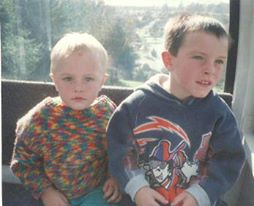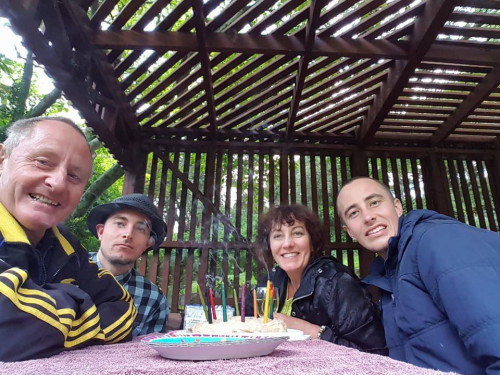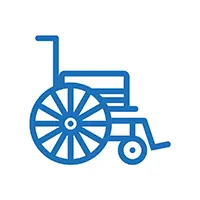Published 15 January 2019
Parents of children with autism should be willing to quit strategies that don’t seem to be working and keep hunting for ones that do.
That’s the advice of a Hawke’s Bay mother of two young men with autism who are thriving in residential communities there.
Ruth Malone and her husband Kim have raised two boys, Jordan, 25, and Brett, 23.
Both boys are on the spectrum but have different needs.
Ruth says the biggest lesson she’s learned is not to be stubborn, but admit when something’s not working and move on.
“If it’s not working, it’s not going to work.
“You’ve got to move on and admit that it’s not going to work. Sticking with it, you’re only going to damage the individual.”
Jordan has severe non-verbal autism with obsessive compulsive disorder, while Brett is verbal but has the added challenge of Tourette’s.
Ruth says the boys are living full, successful lives, but it hasn’t always been easy getting the right support for Jordan and Brett.
The journey has involved heartbreak, some failures and triumphs, and a lot of trial and error.
Finding the right school

While there are social benefits to integrating children with autism into the mainstream school system, at some point special education should be considered, Ruth says.
Jordan and Brett did relatively well at primary school, settling well into a routine and making some academic progress.
But when Jordan was about 15 the support he was getting at school just wasn’t cutting it.
He needed something more specialised, so Ruth and Kim sent him to board at Hohepa Hawke’s Bay, a school dedicated to teaching children with intellectual disabilities.
It’s based on Rudolph Steiner’s principles of holistic education, and children stay at the school until they’re 21.
Ruth and Kim decided on Hohepa because they wanted their boys to have broad life skills to take with them into post-school life.

“When you’re looking at adulthood, two-plus-two doesn’t become as important as learning how to tie your shoes or make a piece of toast, and that’s where autistic people often need those skills.
“They can pick up some of the academic stuff because of the logical way their minds work, they can be quite brilliant, but that’s not life skills.
“That’s where they need the most input and assistance if they’re going to live well as adults, and that’s why we did this with our boys even though it hurt us terribly to let them go.”
Jordan had never been away from Ruth and Kim for more than a week before he left for Hohepa, making it a difficult time for the family.
“We only got through it because we knew it was the right thing to do.
“But knowing that [we were] hurting him was very hard,” Ruth says.
Jordan settled well into the school and found success but with Brett still at home with his parents, he started to struggle.
His school felt that it couldn’t extend him anymore, so Ruth and Kim decided to send him to Hohepa as well.
Ruth says it was extremely difficult to have both boys away from home, but it was nice for Jordan to have his brother there.
But it wasn’t long before Ruth and Kim decided to sell their home in Gisborne and move to Hawke’s Bay so they could be with Jordan and Brett.
Ruth says it was lovely to be closer to the boys as they transitioned out of school life.
Transition to adulthood
Jordan and Brett now both live in residential communities, but have different levels of support.
Brett, the more independent of the two boys, recently moved in to his own chalet at the More Independent Living Project in Taradale, Napier.
It’s a big step forward for him after successfully transitioning out of school.
When he entered adult services two years ago he first went into a transition house where he was encouraged to be a bit more independent.
He then went into another house, and finally into his own place, which is part of a larger complex.
Ruth says Brett has one-on-one time with a support worker one day a week where meal plans and shopping are done.
But he’s expected to do most of it himself.
“Then from five to nine each night one person goes around the chalets and makes sure they’ve made their meals and have taken their medication.
“There are also buttons they can push if they get into trouble during the night.
“It’s a very good model,” Ruth says.
Jordan, who needs a higher level of support, lives on the Hohepa Clive Farm in a house with four other young men.
Because of his OCD, he is monitored by GPS in case he leaves and gets into trouble.
Living full lives

Kim, Jordan, Ruth and Brett celebrating a birthday
Ruth says being in residential communities with appropriate levels of support means her boys can live full, successful lives.
Jordan works every day either in Hohepa’s woodwork studio, which produces toys and furniture, or as part of the estate team which takes care of the grounds on the Hohepa site.
He gets one-on-one support for around 28 hours each week to make sure he’s safe.
Ruth says he lives a very full life in spite of safety concerns.
“He has two lots of swimming he does every week, he goes to animal therapy, and he gets a lot of pleasure out of [working in the woodwork studio].
“That’s why we wanted to send him there, the services available,” Ruth says.
Brett also leads a busy life, working two days a week in Hohepa’s candle making workshop, and two days in the weavery.
“Brett is able to work quite independently once he has been taught techniques, and is able to ask staff for support if he needs it,” Ruth says.
He also works one day a week helping young students at Hohepa School.
Ruth says he loves the work he does with children, and even won a young achievers award for his efforts.
Being persistent in finding support
Ruth says one of the biggest lessons she’s learned raising Jordan and Brett is that you can’t expect the best support to just fall into your lap.
“You’ve got to hunt for it. It’s not going to come to you. Be proactive.
“There’s a lot of information out there but you have to look for it,” she says.














